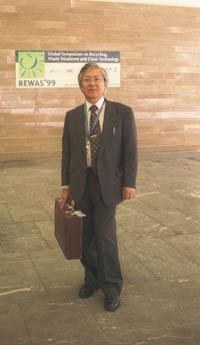"Environmental education is one of our main axes"

Rewas'99, a seminar on recycling, treatment and waste minimization was held last month at the Kursaal Palace in San Sebastian. The meeting, organized by the Inasmet technology centre, was held for the first time in Europe. On the occasion of the meeting, which lasted almost a week, many experts on waste and environment approached the capital of Guipuzcoa. One of them is Japan's Director of Environmental Policy, Japanese Masaru Tanaka. After offering a press conference, Elhuyar magazine responded with kindness to the invitation to the interview.
At the end of next year we will return to another century. What will be the main environmental problems?
We all want a comfortable and healthy society, we want to go there. We move forward but generate too much waste. XXI. In the 20th century waste management will be one of the biggest problems. As we know, we must face the problem and among all. Consumers, manufacturers and governments need to work together to address the problem. Manufacturers should make recycling designs with lower volume and bulk products. The evaluation of the life cycle of the products, the creation of them, their recovery, their duration, the degree of recyclability, etc. are the responsibility of manufacturers.
Consumers, on the other hand, should buy products with recycling options that last a long time when we are going to buy something. Although manufacturers are more responsible, consumers also have something to do because we all pay the cost of waste. Finally, governments must take action against manufacturers issuing illegal dumping for lower costs and facilitate the development of less aggressive technologies with the environment.
Waste management XXI. Problem of the 20th century. And the current one?
The same.
Why is it not solved?
The problem is not the increase in solid waste, but waste is always being generated. Therefore, we build landfills, but as they can only have a value for 7-10 years, then we have to build others. And that does not have an easy solution, because it is difficult to find suitable places, we want to remove the waste, the farther they are placed, the more expensive it comes… in short, the better we live, the bigger the problem.
From a technical and social awareness point of view, Japan is one of the most advanced countries in the world in quality of life and the environment. What is it based on?
Well, first we have to talk about culture. In fact, in Japan the quality of life and the impact that a clean environment can have on it are important values of society, which society has assumed. These values begin to be taught in the centers and have continuity in the homes. Children 6 years old have an environmental theme in school and learn as if it were any other topic; they are talked about recycling, use, resources. If people understand what is happening, they will respect the environment more. In Japan we have bet on the future and education is one of our main axes, but home education is as important as school, as it has to start by separating waste and consuming less. In Japan we have the proverb -modestainai japonés- which collects all this philosophy, which says: "If you don't waste anything, you don't need anything."
In addition to education?
As in many European countries, the correct separation of waste and subsequent selective collection is important, each type of waste is collected in its corresponding bag and subsequently deposited in the corresponding containers. From there we can begin to recover developing treatment and recycling systems. The objective would be, in any case, to minimize the volume of waste, and the aforementioned selective collection, or the collection of electrical appliances and car accessories, are an example of waste minimization. In Japan we have now recycled 10% of household waste.

Do you have a single waste management system?
No, there are many. Every neighborhood, municipality, valley… can be yours. The importance of transport is fundamental, since waste cannot remain in the home for a long time, so fast and abundant transport will allow better separation. At the same time, a volunteer figure has been created that works to offer something to society... and in the end, planning is essential, that is, knowing what is collected before collection and separation, which will be recyclable and which will not. In fact, although some residues are recoverable, others – batteries, fluorescent, etc. – cannot be recycled, but after intermediate treatment they are discarded.
What kind of solutions are given to the waste problem elsewhere in the world?
When talking about solutions, the degree of development of countries must be taken into account. In non-developed Third World countries, all waste, including toxins, is mixed and disposed of. In other developed countries, such as the United States, this tendency to waste is also strong and used to cover soils. Finally, in developed countries with a certain sensitivity there are different waste management systems, but all of them with common elements: selective collection first, separation and then recycling. Of course, in countries like ours the costs are higher.
Would you give recipes to others?
That would be too much, I can only offer what we do. On the one hand, the participation of students and young people in planning and management, so that they understand the problem and participate in the search for solutions. On the other hand, select the right technologies. Finally, work properly on available resources to reduce risks. So pay more.
In addition, it has been pointed out that collaboration between manufacturers, consumers and administration is necessary. There is also a lot of importance to the collaboration between the different administrations; the neighborhoods, the municipalities, the communities… they have to work together to respond to the problems they have. In Japan there are many examples of this collaboration. For example, Osaka and Tokyo have still begun to work together on the construction of a landfill that may be important to both, and will also affect four other regions. Six regions work together and each is building part of the landfill.
You have previously provided some data from Japan. Do you have data from the world?
In the case of waste, it is difficult to provide concrete data, since the definition of waste from one country to another is different. However, to talk about the data, a close relationship is observed between the amounts of waste in the countries and the gross domestic product of the same. In Japan and Europe a kilo of waste per person is generated daily — 8 kilos of industry — in the United States two kilos and in undeveloped countries between 100 and 500 grams per person per day. If it is said that at this time we live some 6 billion people on Earth, a simple calculation allows us to see shortly the amount of waste generated daily. Needless to say, the resulting figure is really alarming.
Do you know the degree of waste management in the Basque Country?
The truth is that I do not know very well the reality of Euskal Herria, but I think it is an advanced country in the treatment and recycling of waste, which is using advanced technology.
Buletina
Bidali zure helbide elektronikoa eta jaso asteroko buletina zure sarrera-ontzian











